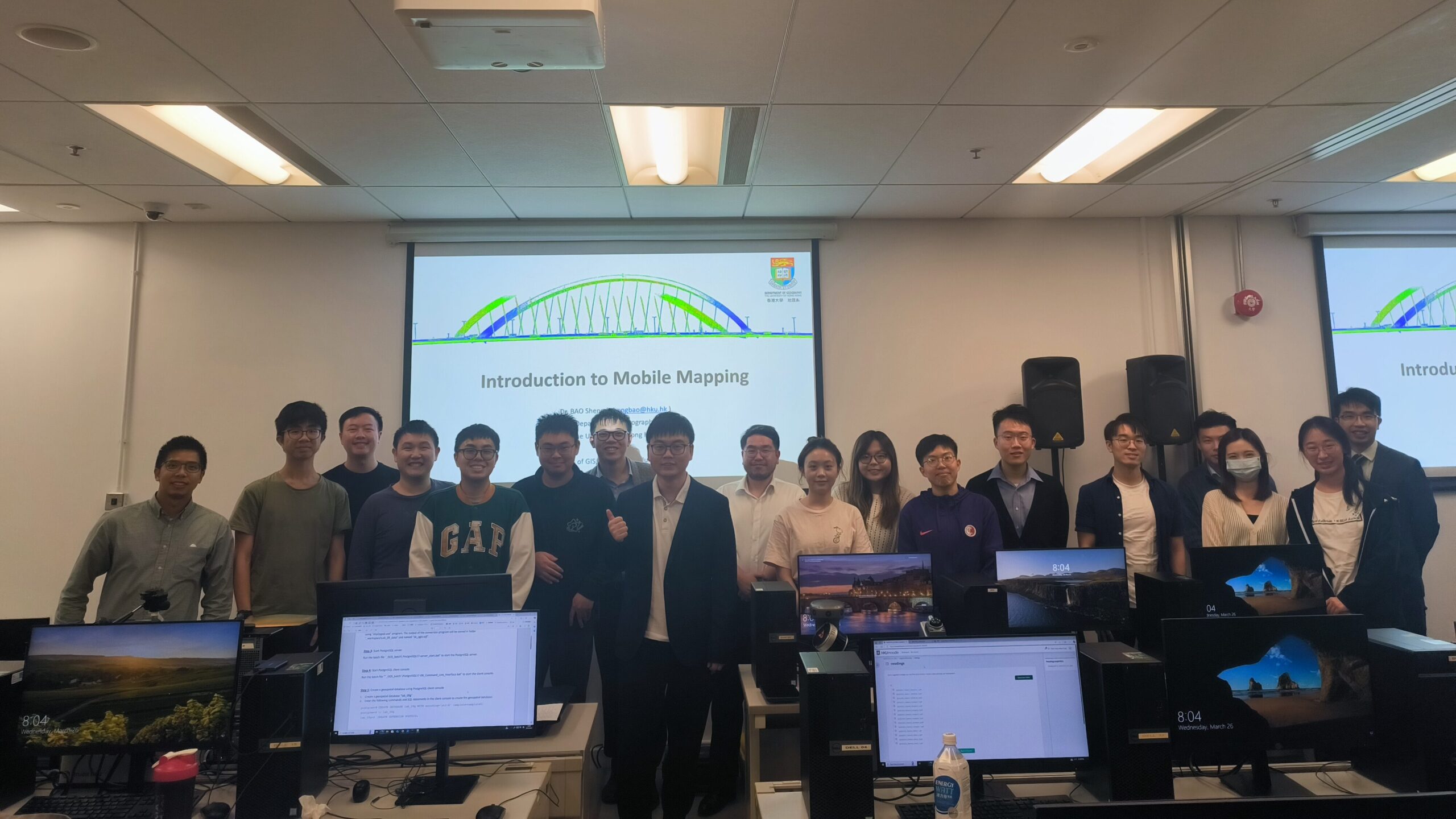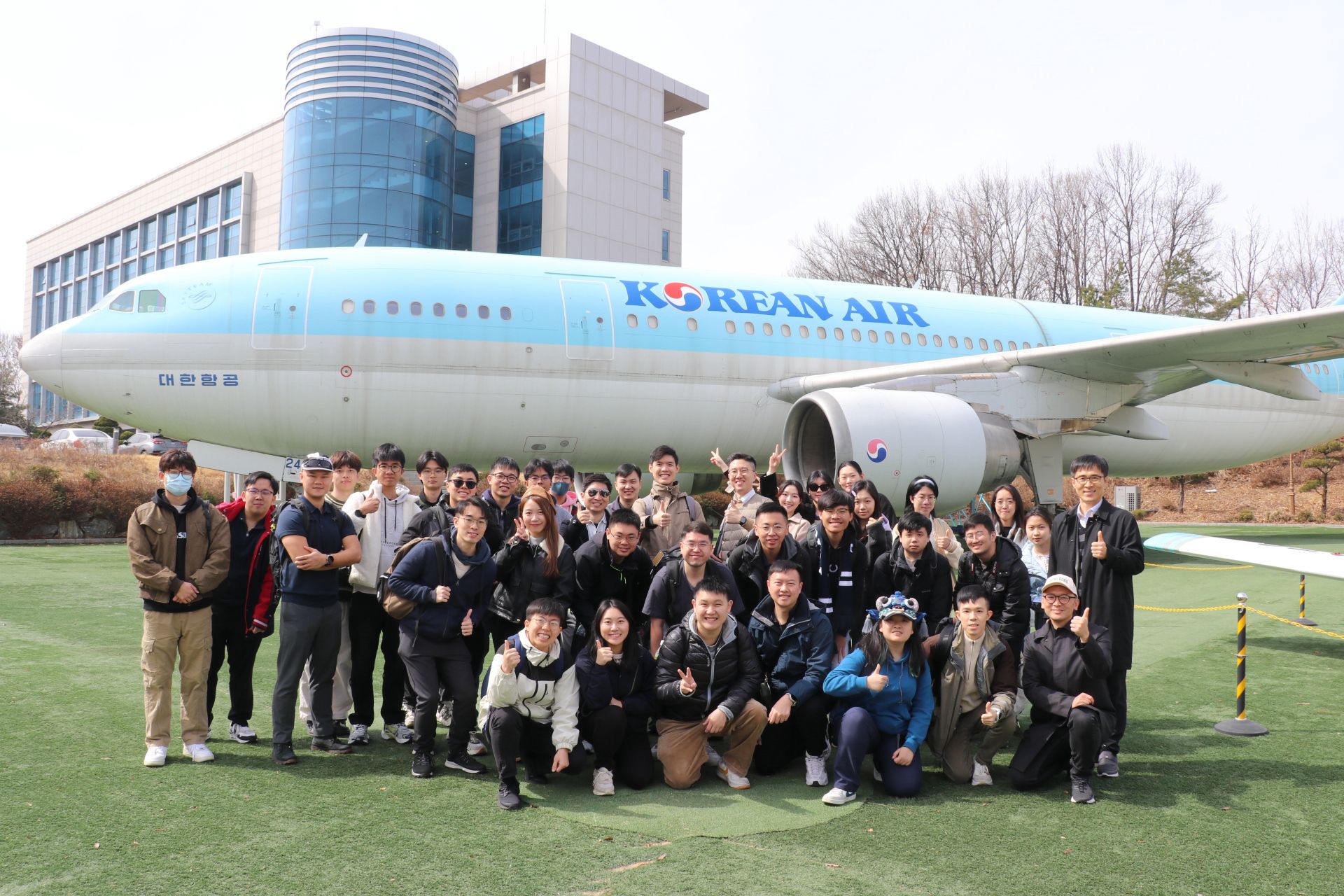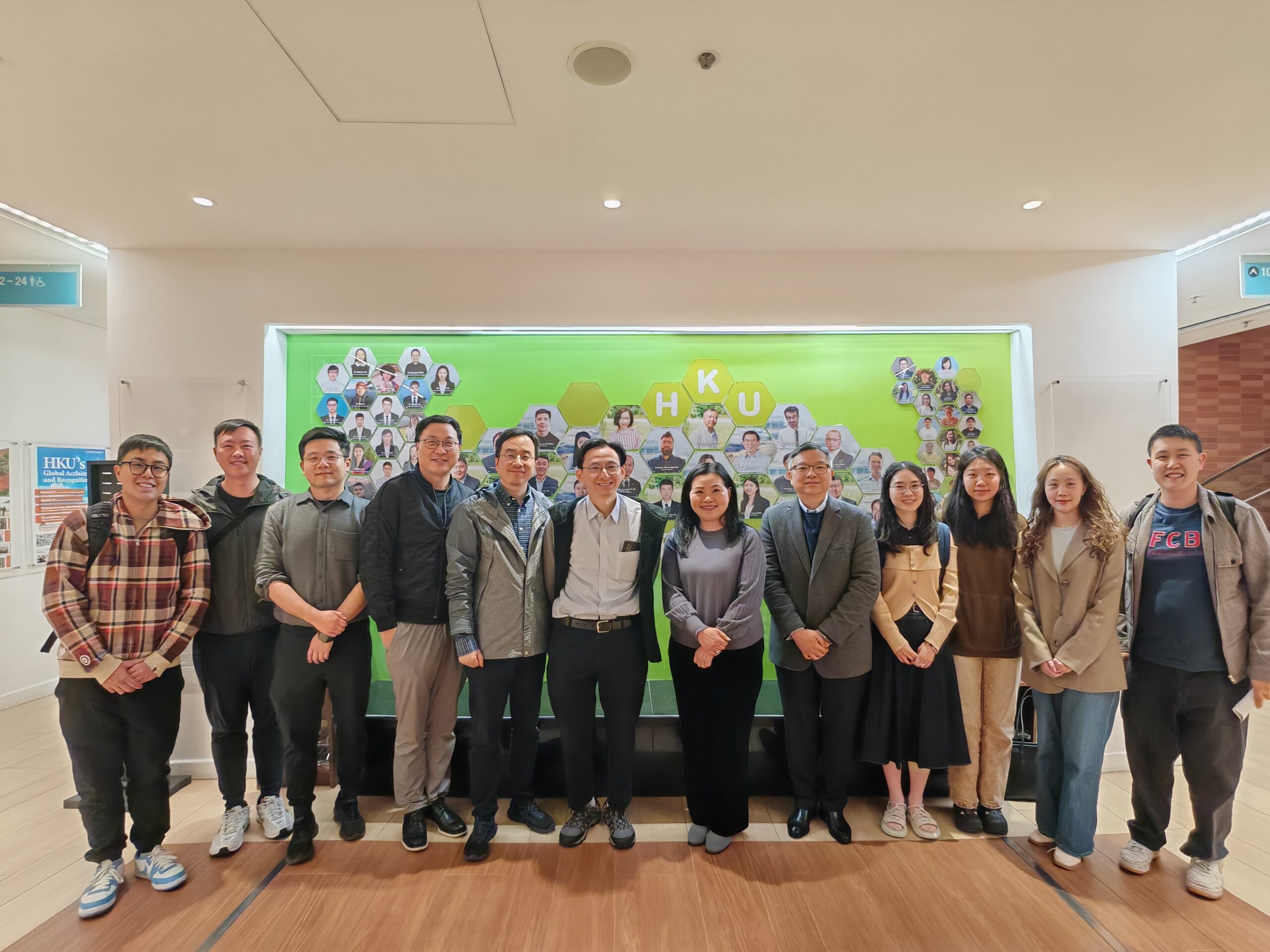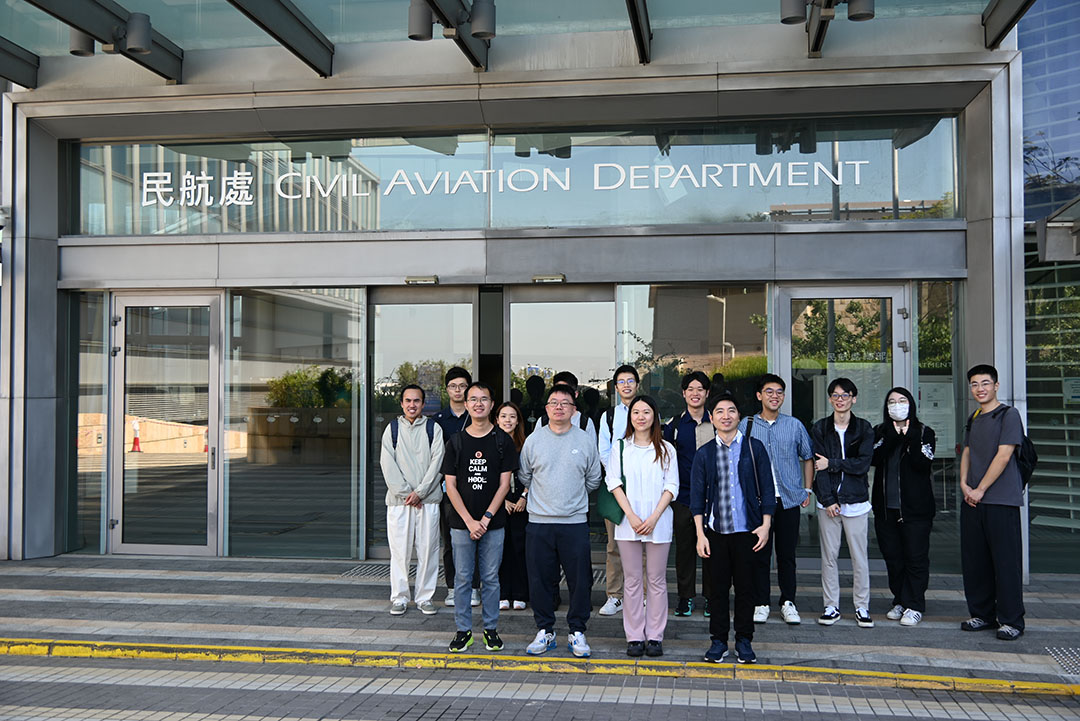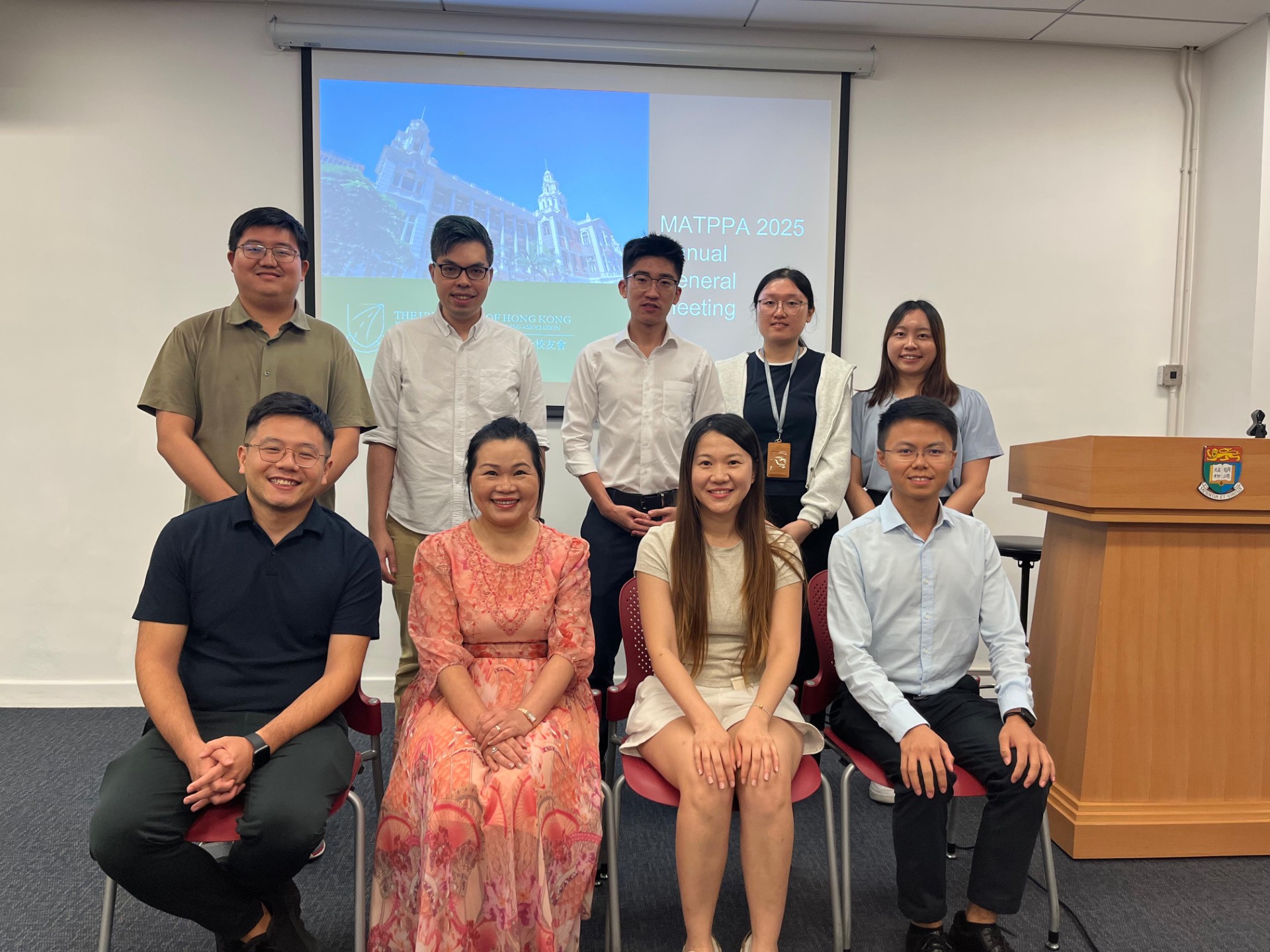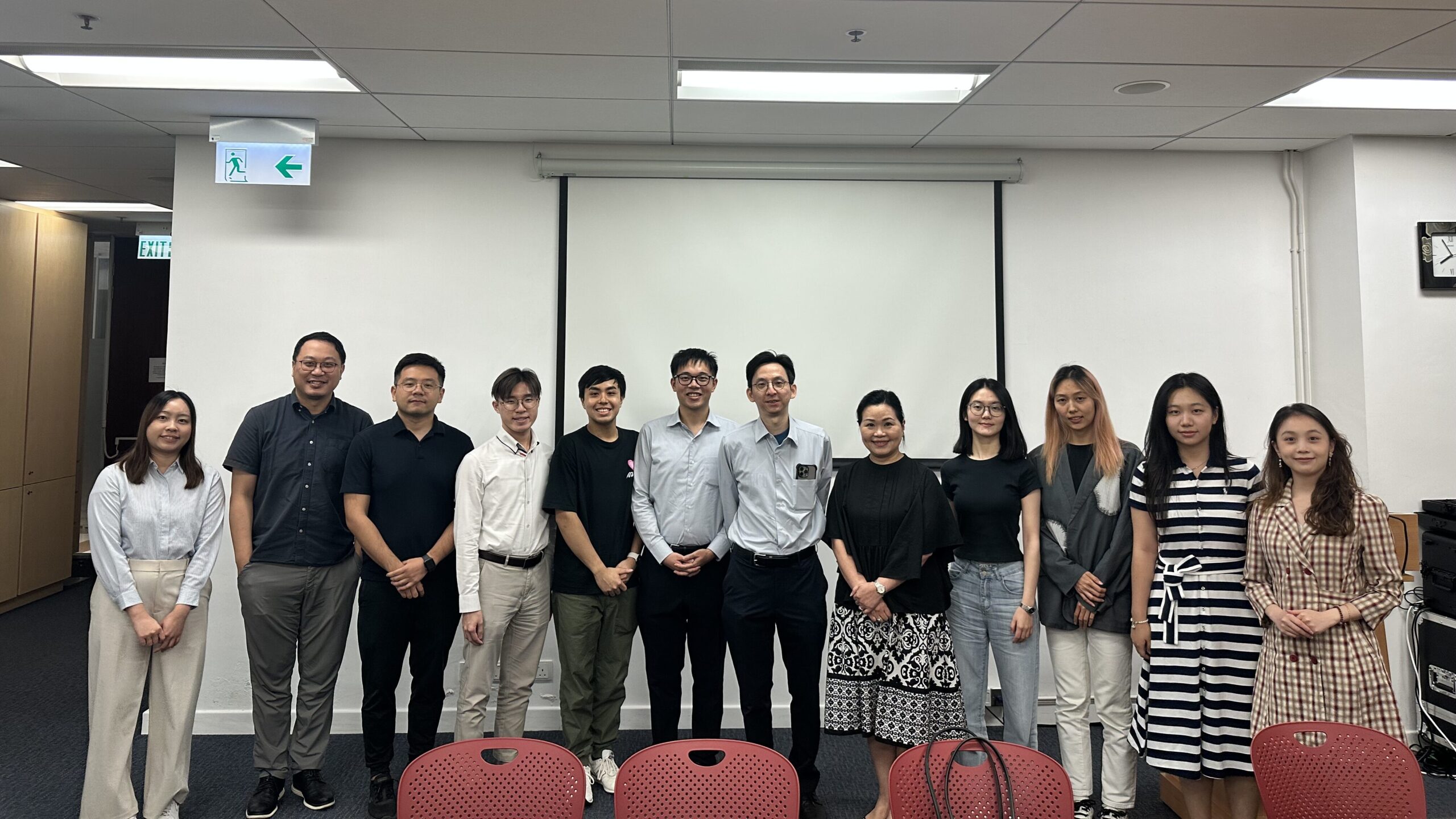PROGRAMME HIGHLIGHTS
PROGRAMME BOOKLET
2026-2027
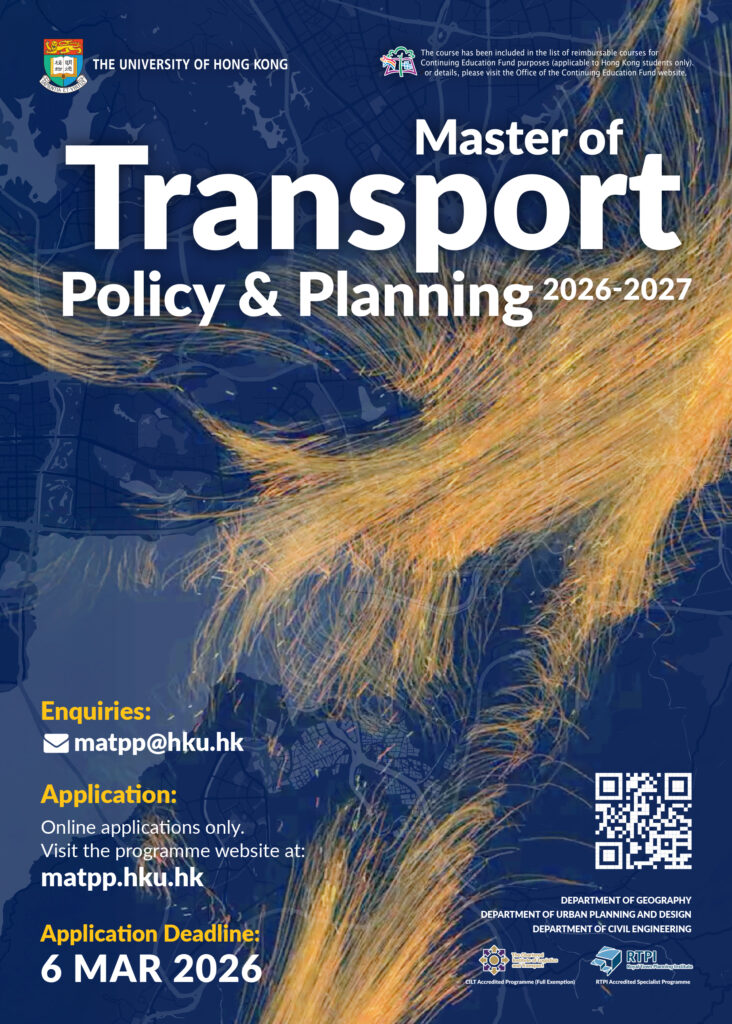
PROGRAMME STRUCTURE
A Flexible Programme Structure
The programme is offered on a one-year full-time and two-year/three-year part-time basis. For the full-time study, the curriculum normally extends over one academic year, while for the part-time two-year and part-time three-year studies, the curriculum normally extends over two academic years and three academic years, respectively.
A Unique and Sharp Focus on Transport Policy and Planning
The programme offers a variety of courses that focus on transport policy and planning, and is the only one of its kind in Hong Kong to specialize in this field. To complete the programme, candidates shall choose one among the following two tracks: Dissertation Track and Non-dissertation Track.
Highly relevant to the needs of the contemporary world
To complete the programme, candidates shall choose one among the following two tracks:
Dissertation Track and Non-dissertation Track.
DISSERTATION
TRACK
7 compulsory courses
(6 credits each)
2 elective courses
(6 credits each)
1 dissertation course
(18 credits each)
Total 72 credits
NON-DISSERTATION
TRACK
7 compulsory courses
(6 credits each)
3 elective courses
(6 credits each)
1 capstone project course
(12 credits each)
Total 72 credits

2025-2026 SYLLABUS
Core Courses
6 credits
GEOG7001 Survey and Data Analysis in Transport Studies
Surveys are commonly used to collect useful data in transport studies. A myriad of survey methods and instruments are available. This course covers the major aspects including survey design, sampling, hypothesis testing, interview and questionnaire design, survey implementation and administration, data processing, analysis and report writing. Different aspects of surveys are discussed with reference to the transport-related professions and disciplines in different political and socio-economic contexts. Examples include travel characteristics, origin-destination, freight and public transport surveys conducted in Hong Kong and the other parts of the world. The fundamentals of spatial and non-spatial data analysis are covered using selected software. Moreover, some key opportunities and challenges of big data and insights from data science are discussed.
Coursework: 100% | Examination: 0%
GEOG7002 Transport and Development
This course introduces the interrelation of, and interaction between the transport system and development at global, national, regional and local levels. Topics with reference to the development theories and the elements of sustainable development are covered. In addition, the impact of transport development on spatial organization and the significance of integrating transport with land use planning are presented. Furthermore, the influence of technological advancement on transport operation and the implications of political activities on transport decisions are discussed.
Coursework: 30% | Examination: 70%
GEOG7006 Engineering for Transport Systems
This course introduces students to the engineering aspects of typical transport systems covering their planning, policy formulation, design, implementation, and operation. It utilizes theoretical/conceptual ideas and practical examples to build a systems perspective of the railway, road, air, and intermodal systems. Key aspects of the development of transport infrastructure, choice of systems to meet transport demand, technological applications and institutional arrangements for the administration and operation of these systems will be presented.
Coursework: 50% | Examination: 50%
GEOG7007 Analysis, Modeling and Project Appraisal in Transportation
This course introduces students with case studies to various practical travel demand modelling and project appraisal techniques developed for and employed in the transportation sector. The first part of the course covers various techniques used to model travel behaviour and discusses the role and limitations of model application in the transport planning process. The basic concepts, structures and assumptions of transport modelling including traffic generation, distribution, modal split and traffic assignment, are introduced and illustrated using local examples. The application of transport models in traffic impact assessment will be discussed. The second part covers appraisal principles, methods and procedure of transport projects. Financial analysis, cost-benefit analysis and sensitivity analysis will be discussed with reference to assessments of actual transport projects. The emphasis of the course is on the application of the techniques and methods commonly used in transport planning and project appraisal. The course will enable students to understand the theories and techniques in demand modelling and project appraisal, and apply them to practical exercises in transport planning and project development.
Coursework: 100% | Examination: 0%
GEOG7011 Research Methods in Transport Studies
This course aims at guiding students to prepare the MATPP Dissertation through presenting a conceptual framework of the major/classic research methods, data analysis techniques and related group discussion sessions. Major aspects of scientific research will be covered, including proposal writing, literature review, research integrity, academic presentation and scientific writing. Also, it provides opportunities to students to learn and reflect the latest developments in transport-related field via the endorsed seminars.
Coursework: 100% | Examination: 0%
URBP6123 Public Transport Systems
This course is designed to examine the nature and the role of public transport systems mainly in the urban context with special reference to high density development. Topics include the nature and the characteristics of passenger transport, the operation and management of public transit systems, deregulation and privatization, the role of para-transit, and multi-modal cooperation and competition.
Coursework: 100% | Examination: 0%
URBP6131 Transport Policy and Planning
This course focuses on key issues in transport policy and the implementation of transport plans and programmes. It examines the role of private and public modes within the overall urban transport system as well as pedestrian movement planning, airport development and seaport development. The course uses examples drawn from various countries to evaluate the appropriateness and effectiveness of alternative policies and implementation mechanisms.
Coursework: 100% | Examination: 0%
Electives Courses
6 credits
GEOG7003 Transport Economics
This course helps to develop a specialist appreciation of the economics of urban transport provision. It highlights the economic principles and techniques employed in planning, operating and managing our city transport systems and concentrates on topics such as: travel time valuation, road congestion costing and pricing, public transport finance and cost-recovery, and economic appraisal techniques employed therein.
Coursework: 60% | Examination: 40%
GEOG7010 Transport Law and Management *
This course covers the legal framework for carriage and the mechanisms of transport management. Under transport law, topics covered include the contracts of carriage, bills of lading, charterparties, freight and demurrage, master’s authority, shipowner’s duties, loading and unloading, introduction to admiralty jurisdiction, marine insurance and protection and indemnity clubs (P & I Clubs) and an introduction to carriage by the air and by road. Built on the legal background, the topics of transport management include the administrative and regulatory measures generally applied in particular for road traffic, public transport services and transport infrastructures.
Coursework: 40% | Examination: 60%
* May be offered biennially
GEOG7012 Transport Field Trip *#
This programme-based field trip is designed to provide opportunities for students to examine first hand transport-related developments and problems in China or nearby region with a comparison to the situation in Hong Kong. Before the field trip, students are required to attend a number of pre-trip lectures. After participating in the field trip, students are required to submit a field trip report and attend debriefing sessions. The report will be formally assessed. The field trip will be organized during the reading week either in the first semester or second semester, subject to the final decision of the field trip co-ordinator. Students enrolling in this course has to bear their own cost on air tickets and accommodation.
Coursework: 100% | Examination: 0%
*May be offered biennially
# Students enrolling on this course have to bear the cost of air tickets, meals and accommodation.
GEOG7014 GIS in Transport Planning and Management
This course introduces the principles and applications of applying geographic information technologies to transport planning and management. It focuses on the operation and practice of GIS to solve realworld transportation problems such as finding the shortest route, identify service area, solving the traveling salesman problem, locate facilities and allocate demands to existing facilities and so forth. After this course, students are able to demonstrate the skill of applying GIS to solve problems related to transportation issues.
Coursework: 100% | Examination: 0%
CIVL7018 Data Science for Civil Engineering
This course aims to introduce the theory of data science and its application in a wide range of civil engineering problems. Topics will include linear basis function models, regularization approaches, linear discriminative analysis, logistics regression, support vector machines, ensemble learning, neural networks for solving supervised learning problems, k-means clustering, expectation-maximization for solving unsupervised learning, and reinforcement learning. Software packages such as PyTorch and scikit-learn will be used to support the demonstration of practical civil engineering applications in the course.
Coursework: 50% | Examination: 50%
* May be offered biennially
CIVL7019 Statistical Methods for Civil Engineering
Multiple linear regression, logistic regression, logit models, Poisson regression models, duration models, time series models for data analytics and behavioural studies.
Coursework: 50% | Examination: 50%
DASE7222 Decision Analytics in Global Logistics
Global operations and logistics strategies, strategic changes required by globalization, the strategic framework for global operations, the role of logistics in global operations and marketing strategies; global operations and logistics planning, supplier network development, physical distribution, global logistics network design, global supply chain management, risk management in global operations; management of global operations and logistics, operations analysis of global supply chains, information management for global logistics, performance measurement and evaluation in global logistics.
Coursework: 40% | Examination: 60%
Other Courses
GEOG7015 MTP&P Capstone Project Course (Equivalent to 12 credits)
To complete the curriculum, a candidate of non-dissertation option must complete a practical transport-related group project and an individual report. The capstone project course offers students the opportunity to work collaboratively under the supervision of a project supervisor, typically from the transport industry or the government, and apply the knowledge and skills they have acquired throughout the programme to tackle a practical transport-related problem and complete a project that is relevant to society. Based on the group project work, individual capstone reports will be prepared and assessed.
Coursework: 40% | Examination: 60%
* May be offered biennially
GEOG7016 MTP&P Dissertation (Equivalent to 18 credits)
To complete the curriculum, a candidate of dissertation option must complete a topical study or research project under the supervision of a dissertation supervisor in two parts. The first part is a dissertation of 10,000 – 20,000 words, with a focus on one of the passenger or freight transport modes and on a global, regional, or local scale. The second part consists of a signed communication record with the supervisor and a presentation of research findings in the ‘dissertation seminars’ series. Attendance and participation in the ‘dissertation seminars’ series are required. Students who have not presented in the dissertation seminar series will not be permitted to submit their written dissertations for grading purpose.
Coursework: 100% | Examination: 0%
* May be offered biennially
# Students enrolling on this course have to bear the cost of air tickets, meals and accommodation
Elective courses may not be offered if the class size is considered too small (e.g. less than five students). Some elective courses cross-offered by other programmes may have quotas for MATPP students. Details will be announced by the programme in due course.
Discovering the World and Myself
01
Pursuit of professional excellence, critical intellectual inquiry, and life-long learning in transportation
02
Tackling novel situations and ill-defined problems in transportation
03
Critical self-reflection and greater understanding of others, as well as the upholding of professional ethics in transportation
04
International understanding and a global outlook on transportation
05
Communication and collaboration
06
Leadership and advocacy in transport policy and planning issues
SEMINARS & EVENTS
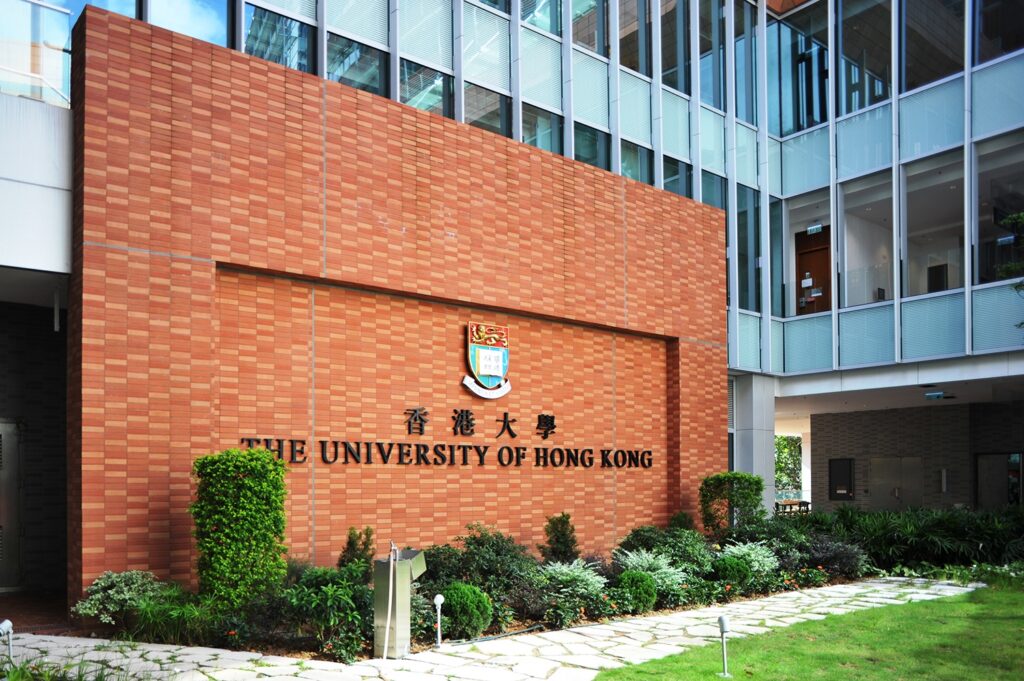
REGULATIONS & SYLLABUS
Important Information
AWARDS, PRIZES & SCHOLARSHIPS
PROGRAMME-BASED AWARDS
Transport Policy and Planning Graduate Award
The “Transport Policy and Planning Graduate Award” is awarded to one graduate who has completed all the requirements and obtained a Distinction in his/her studies in that academic year.
Year
Name of Awardees
2023-2024
Wang Zeyu
2021-2022
Lim Agatha Sacha Lee
2018-2019
Lau Cheuk Yin
2016-2017
Cheung Cheuk Wai Jeffrey
2014-2015
Ho Choi Yan
2012-2013
Chen Jinchao
Year
Name of Awardees
2022-2023
Chow Kam Wa
2020-2021
Lam Lok Son
2017-2018
Chen Nuo
2015-2016
Tse Tsz Chun
2013-2014
Liu Xiyuan
Transport Policy and Planning Dissertation Prize
The “Transport Policy and Planning Dissertation Prize” is awarded to one student who received the highest mark among the grade A dissertations in that academic year.
Year
Name of Awardees
2023-2024
Cheung Y
2021-2022
Wang Xiaohan
2019-2020
Kwok Oon Hei
2017-2018
Chen Nuo
2016-2017
Chu Wan Ying
2014-2015
Ho Choi Yan
2012-2013
Lee Ming Yan
Year
Name of Awardees
2022-2023
Ngai Wing Yin
2020-2021
Loh Xin Ping
2018-2019
Yip Ki Fung
2017-2018
Lau Sze Nga
2015-2016
Tse Tsz Chun
2013-2014
Chan Lang Hang
Transport Policy and Planning Scholarship
The Scholarship is open to application for all MTP&P full-time candidates who have achieved First Class Honours or equivalent in their undergraduate studies and/or a Distinction in their master studies.
Year
Name of Awardees
2025-2026
He Dichen
2024-2025
Xu Shiya
2023-2024
Huang Zian
2019-2020
Kwok Oon Hei
2018-2019
Marlon Ives Tanuihusada
2017-2018
Jasper James Walker
2015-2016
Fang Qi
2012-2013
Chen Jinchao
2010-2011
He Jian Feng
2009-2010
Ng Wing Yan
Year
Name of Awardees
2024-2025
Huang Zhuoming
2023-2024
Ma Qingqing
2020-2021
Loh Xin Ping
2018-2019
Li Lu
2018-2019
Yang Yang
2017-2018
Yang Yuling
2015-2016
Tse Tsz Chun
2011-2012
Wu Juanyu
2010-2011
Hui Kwan Pik
2009-2010
Ng Chiu Kit
EXTERNAL AWARDS
CILTHK Scholarship
Year
Name of Awardees
2020-2021
Chen Chi
The Women’s Foundation’s Logistics and Transport Scholarship
Year
Name of Awardees
2013-2014
Lau Lai Yin Vanessa
Year
Name of Awardees
2013-2014
Ho Choi Yan
PROFESSIONAL DEGREE
& MEMBERSHIP STATUS
CILT Accredited Programme
(Full Exemption)
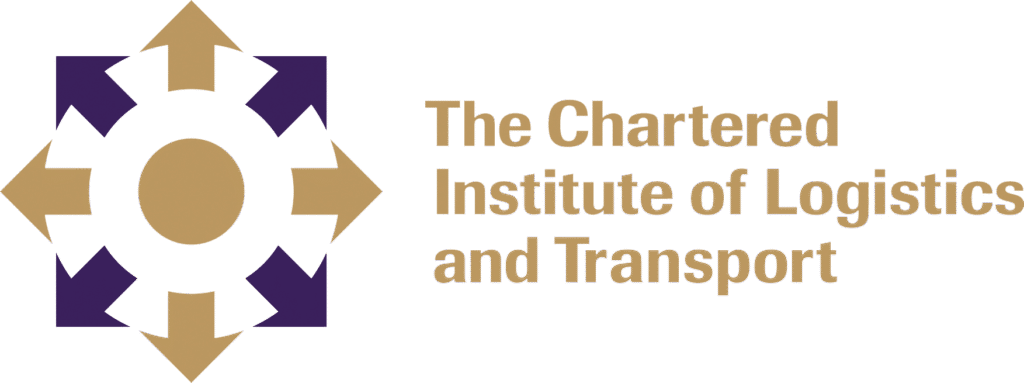
Graduates of this programme will be automatically exempt from the examination requirements leading to the qualification of Chartered Membership of The Chartered Institute of Logistics and Transport (CMILT). The prestige attached to these designatory letters is recognized in the industry throughout the world. For requirements about relevant practical experience, please visit the CILTHK website at http://www.cilt.org.hk.
RTPI Accredited Specialist Programme

This course is also a Royal Town Planning Institute (RTPI) accredited specialist programme. Graduates of this programme can apply to HKU’s Master of Science in Urban Planning through the advanced standing route with a waiver of five modules. The Master of Science in Urban Planning programme is fully recognized by both the Hong Kong Institute of Planners and the RTPI for becoming a chartered professional planner after gaining relevant practical experience.
Similar advanced standing schemes are available for other overseas RTPI accredited Spatial Masters. For a full list of the RTPI accredited courses and accredited planning schools, see http://www.rtpi.org.uk. Applicants to these other RTPI accredited Spatial Masters should write to the relevant planning schools for advice.

